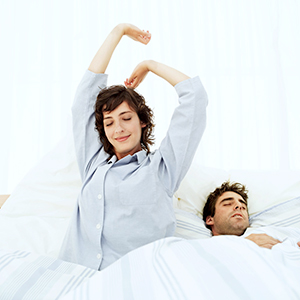Good Sleep, Good health
We tend to spend much of our time working and engaging in numerous daily activities, and forget to pay attention to the issue of getting adequate sleep. Many of us think that sleep is a less important factor in our daily life. However, inadequate sleep can result in a weaker immune system, which can lead to disease or illness. In addition, inadequate sleep is a common cause of emotional instability, loss of concentration at work and premature skin-aging.

Have you been experiencing any of these symptoms lately?
- Difficult getting out of bed in the morning
- Extreme fatigue, or sleeping during daytime
- Increased facial wrinkles or dark areas under the eyes
- Increased white hair
- Slow wound recovery
- Unexplained weight gain
- Decreased muscle mass
- Frequent colds, allergies and other infections
If you have experienced three or four of the above for weeks, you are sleep-deprived and are at risk of developing obesity, heart disease, Alzheimer’s disease, cancer and depression.
When we talk about sleep, we need to understand that there are two phases of sleep:
- Ordinary sleep, called Non-rapid eye movement or NREM sleep. NREM sleep is subdivided into three to four stages. The early stages are referred to as the sleep initiation phase where we will start to feel sleepy. However, we can still respond to external stimuli and be easily roused without feeling drowsy.
- Rapid eye movement or REM sleep. REM sleep is deep sleep. At this stage, we do not respond to external stimuli and if someone tried to wake us up, we would feel very drowsy. During REM sleep our body undergoes the daily repair it needs, with the secretion of growth and anti-aging hormone.
Growth hormone is secreted from a small gland that sit at the base of the brain called the pituitary gland. Apart from its repairing action, growth hormone also helps enhance memory, increase immune defence, rejuvenate the body and slow down all aging processes. The higher your growth hormone level, therefore, the younger you remain both physically and mentally. However, if you have a low level of growth hormone then you will experience deterioration such as thinning of bones (osteoporosis), muscle-loss (sarcopenia), increased wrinkles and constant fatigue
Growth hormone is secreted during REM sleep, particularly during midnight to 1.30 a.m. Therefore, to maintain your optimum health and youthfulness the best time to go to bed is 10.00 pm, and no later than 11.30 pm in order to receive the maximum benefits.
Here are more tips to help you make the most from your sleep:
- Turn off your mobile phone and electronic devices two hours before your bedtime. These devices emit radio frequencies that can interfere with your brain-waves during sleep. Furthermore, the blue light from electronic devices suppresses the secretion of melatonin, the sleep hormone, in the brain. A recent study found that blue light reduces melatonin secretion by 22 percent.
- Do activities such as meditation, knitting or painting to calm your mind before going to bed.
- Make sure that your bedroom is completely dark by turning off all light sources
If you feel hungry at bedtime, have a light snack that contains tryptophan - such as banana or soya milk. Tryptophan is the building block of serotonin, a neurotransmitter that promotes good sleep. In addition, supplements such as melatonin and L-theanine, an amino acid found in Japanese green tea, can help you sleep more soundly.
References:
- Payne J.D. (2011) Learning, Memory, and Sleep in Human. Sleep Med Clin. Vol.6: pp15-30
- Williams, Caroline. How Much Sleep Do You Really Need? New Scientist Magazine. 28 May 2016. Vol. 230. No. 3075. United Kingdom
- Y. Yakahashi, D.M. Kipnis and W.H. Daughday. (1968) Growth hormone secretion during sleep. Journal of Clinical Investigation: September; Vol 4, No. 9: pp. 2079-2090
Credit : Dr TANUPOL VIRUNHAGARUN (Specialty : Anti-Aging Medicine)
